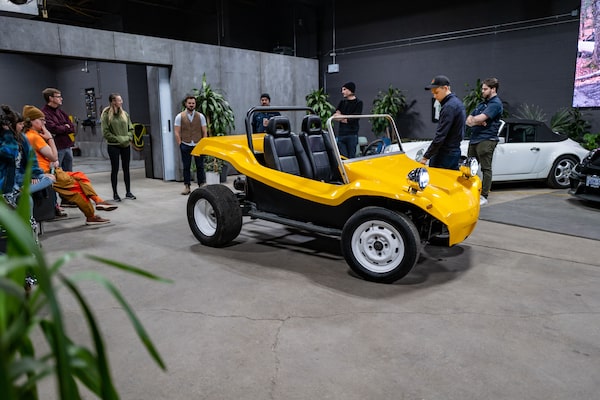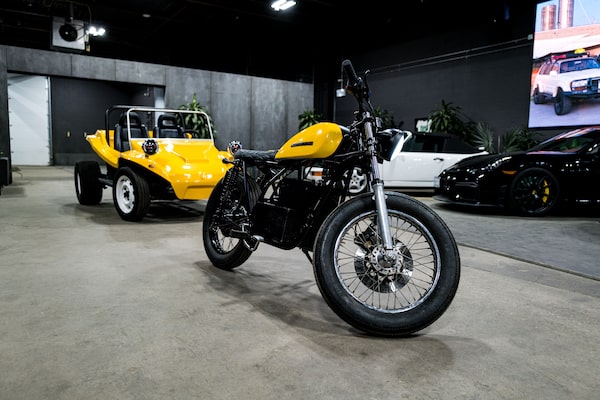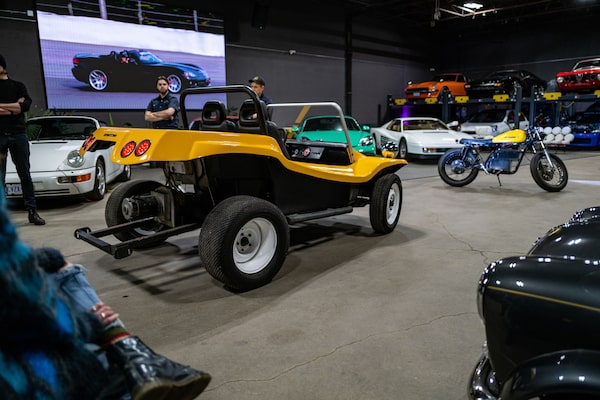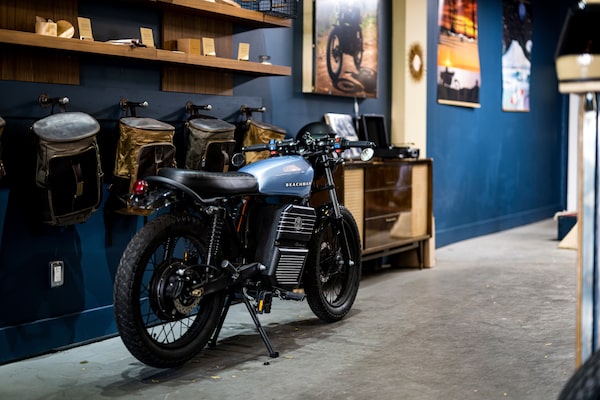
The first Beachman e-bikes were born out of a meeting at a coffee shop between Ben Taylor and his then-neighbour, now co-founder, Steve Payne.Hamid Lalani/The Globe and Mail
For now, at least, Beachman Motor Co. Ltd. is a three-person operation, headquartered in a West End Toronto warehouse, designing and assembling electric bikes that resemble 1960s café racer motorcycles. But the company’s first e-bikes were such a hit – the first batch of 30 sold out in two weeks in 2021 – that now Beachman’s two co-founders are making big plans to electrify a lot of other things: vintage motorcycles, mopeds, a dune buggy, an old Volkswagen bus and a handful of Shelby Cobra replicas.
Electrification is the Wild West, transportation’s new frontier. “It’s like saying ‘tech’ in the 90s,” Beachman co-founder Ben Taylor says. “It’s a huge, hot-button thing.”
Out here on the electric frontier, almost anything goes, from one-wheeled hoverboards, to stand-up scooters, to electric snowmobiles to personal watercraft and quad-motor supercars with 1,000 horsepower. And upstarts like Beachman are largely free to explore all the possibilities.
“We’re going to be the first Canadian company ever to make an electric moped,” Taylor tells a gathering of roughly 20 guests at RClub, a Toronto social club for car enthusiasts. It’s a bold claim, but there’s a chance this three-person company could pull it off.
The first Beachman e-bikes were born out of a meeting at a coffee shop between Taylor and his then-neighbour, now co-founder, Steve Payne. Taylor wanted to build a small 50cc café-racer-style moped and Payne, a trained mechanic who already had a side hustle building custom motorbikes, suggested the moped should be electric instead. The first 30 Beachman e-bikes sold out quickly and they knew they’d hit on something.

A new Beachman electric motorcycle on display for guests at RCLUB, a Toronto social club for car enthusiasts, on Jan. 12.Hamid Lalani/The Globe and Mail
To date, the company has sold roughly 250 e-bikes, says Taylor. In their online shop, you’ll find branded gear such as Beachman corduroy hats and Beachman coffee, as well as the latest Beachman ‘64 e-bike. It was developed with money from a crowdfunding campaign that raised more than $300,000. The $4,600 e-bike has a claimed range of 90 kilometres from a 40-amp-hour lithium-ion battery.
Ontario allows these motorcycle-style e-bikes on the road, but they’re limited to a top-speed of 32 kilometres an hour British Columbia doesn’t. (The electric frontier won’t stay wild forever.) That – and the fact it has eager customers waiting in B.C. – prompted Beachman to develop an electric moped that could be plated and insured, Taylor said.
The moped – also known as an LSM, or Limited Speed Motorcycle – is still a work in progress. The specifications have yet to been finalized, but this road-legal vehicle will cost $6,000 –$8,000, and have a range of roughly 90 kilometres and a top speed of up to 70 kilometres an hour.
Unlike the e-bikes, the e-moped will require riders to have a licence, insurance and registration. It’ll also need to be certified as roadworthy by Transport Canada, which is a lengthy and difficult process for a small startup. Beachman is currently working with hired consultants to help with the process.

Beachman has built a one-off electric dune buggy.Hamid Lalani/The Globe and Mail
“It’s taken us years just to get this thing on the road, where it took us, like, two weeks to sell 30 e-bikes,” Taylor says.
Beachman hopes to have the e-mopeds ready and certified by the end of the year, which – if they can pull it off – would make Beachman a true motor vehicle manufacturer, rather than a bicycle company.
“Once everything goes through, because we’re actually doing the assembly in Canada, even though parts are coming from other parts of the world, we would be a recognized Canadian manufacturer. We would stamp the VIN [Vehicle Identification Number],” Payne says.
The recent show-and-tell at RClub was a chance for Beachman to delight some curious gearheads with news of the road-legal moped, a one-off electric dune buggy, and the brand’s first electric motorcycle.
Payne built the eye-grabbing dune buggy mainly because he could; it’s not road legal and only used as a runabout, mainly for carting things and people around the company’s warehouse, although a few companies have expressed interest in buying it to use as a marketing vehicle.
Beachman’s first electric motorcycle is for sale, but it’s not exactly new. The low-slung black-and-yellow bike began life as a 1974 Kawasaki KZ 400, and is still registered as such. Beachman ditched Kawasaki’s internal-combustion engine and replaced it with a 120-amp-hour lithium-ion battery pack and a hub-mounted electric motor. Payne says it can reach 80 or 90 kilometres an hour comfortably and has an estimated range of more than 200 kilometres, although they haven’t confirmed that yet.

The Beachman 64 e-bike, which was developed with money from a crowdfunding campaign that raised more than $300,000.Hamid Lalani/The Globe and Mail
The bike on display – nicknamed Bumblebee – was built for a customer, who paid about $12,500 for it, according to Taylor. Beachman is already undertaking similar builds using different vintage motorcycles as a base. Because of that, these electric “restomods” – vehicles that have been restored with modern parts – can be insured and plated and ridden as a motorcycle.
“We’ll take on a few customers that we respect and who have good taste and they’ll let us build something cool,” Taylor says. Prices could hit $20,000.
So far, Taylor and Payne are trying to build Beachman on their own, using revenue, crowdfunding, their own savings and loans. “We have a lot of guys, dudes who love cars that want to invest and they’re like, ‘How can I give you my money? How can I be involved?’” Taylor says. For those deep-pocketed customers, instead of selling them part of the company, Beachman is looking into offering them a small run of electric cars based on the Factory Five Racing company’s build-it-yourself kit cars that look like Shelby Cobras. But, that’s still just an idea.
For now, Beachman’s three employees have their hands full with the dune buggy, the e-moped, and the modified retro motorcycles. Who knows what’s next?

Beachman’s first electric motorcycle, a 1974 Kawasaki KZ 400, which had its engine replaced with a battery and electric motor.Hamid Lalani/The Globe and Mail
Shopping for a new car? Check out the Globe Drive Build and Price Tool to see the latest discounts, rebates and rates on new cars, trucks and SUVs. Click here to get your price.